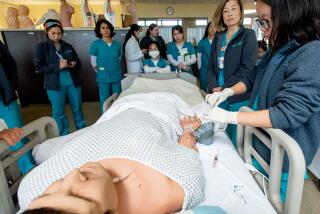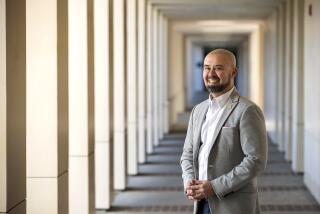Community College Graduations Mark Milestones for Many
OXNARD — More than 20 years after she began taking courses, Oxnard College’s oldest graduate received her associate’s degree Friday.
Through tears, 76-year-old Esther Angelette thanked her five children, 10 grandchildren and great-granddaughter for their patience and support. She then turned and hugged those handing out the degrees.
“Since we came to California in 1970, she’s been determined to get a degree,” said her daughter Dolly Lindley. “She sets an awesome example . . . ‘If you persist, you’ll get it.’ That’s what she’s always told us and now she’s got what she’s always wanted.”
Angelette joined nearly 250 of the 400 students eligible to receive an associate degree in Oxnard College’s commencement ceremonies.
Moorpark College also held its graduation Friday.
Oxnard College, which opened 22 years ago as a storefront classroom, now has more than 6,000 students, trustee Norman Nagel told the graduates.
Oxnard’s new president, Steven F. Arvizu, was then warmly welcomed with a standing ovation. He temporarily left his post as executive vice president at CSU Monterey Bay to greet the community. He will assume his new duties July 7.
Judith Valles, who was appointed acting president in July 1996, was also greeted with a standing ovation as she bid the graduates farewell.
“I saw Oxnard College had a great deal of heart, and was deeply touched by all I met this year,” Valles said, choking back tears. “But I will continue to stay in touch . . . . For some, it’s been a very difficult and tough road--there’s been many obstacles in life that have tried to keep you from this but you have persevered.”
And, indeed, they have. When keynote faculty speaker Lori Buckley asked the graduates who have children or grandchildren to stand, more than half stood. Nearly all of the second half stood when she asked who also had to work while attending college.
Naomi Ontiveros, 42, was one of those students.
Ontiveros, a widow, mother of seven children ages 7 to 23, and grandmother of three, started at Oxnard College three years ago when she figured the children were old enough to start caring for themselves.
“I knew I was always stressing an education to them and I figured I’d be an example, a role model, if I went to school and got educated,” Ontiveros said, adding that she also needed to prepare herself for the work force because her husband’s death benefits were running out.
Ontiveros put herself through school by working at the Women’s Re-Entry Center. And apparently her example has taken hold with at least one of her children, who started taking computer classes this semester and is already registered for summer and fall courses.
But Ontiveros is finished with school for now; she will spend this summer looking for a position that will let her work with youth at risk.
At Moorpark College, commencement speaker Darlene Pacheco, the retiring vice president of instruction, started her speech by reminding students and family members of how much the school has grown over the decades. Moorpark college opened doors to its first class of 1,500 students in the fall of 1967. About 400 of the 900 students eligible to receive their associate degrees attended Friday’s ceremony.
“I want you to look at these trees for a second,” she said, pointing to the sprawling sycamore trees shading part of the quad. “I want you to know that when I came to Moorpark College, I could jump over them. I could still jump then.”
She reminded students that, compared to most of the world’s population, they are privileged--among the few able to attend a college.
“It is my hope that you will be able to break the barriers to achievement thrown up by poverty, ignorance, despair, racism and self-doubt,” she said.
Veronica Martain-Haverbeck, 38, one of the graduates, knows about barriers.”I feel I’m a representative for many groups,” said the single mother of four children, ages 11 to 20. “Through a back injury, I ended up being disabled and then homeless. I am also a woman who broke away from the cycle of domestic violence. And I am a minority, having been born in Chile.”
Becoming financially strapped and relying on welfare made Martain-Haverbeck realize that the only way out was an education.
“I really want to be an incentive to women that are indigent or stuck in domestic violence,” she said. “Although it takes a lot of perseverance, and the health problems are a constant battle, I know the only way to get out is to keep pushing for and actually get these degrees.”
More to Read
Sign up for Essential California
The most important California stories and recommendations in your inbox every morning.
You may occasionally receive promotional content from the Los Angeles Times.










